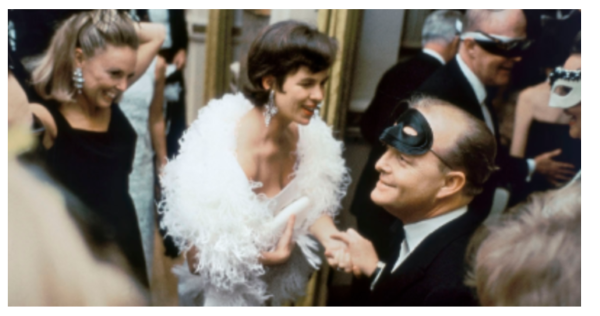

In 1975, Truman Capote had Proustian ambitions for his next book, which he hoped would be his masterpiece. This satirical novel of manners, which Capote had been writing for almost 10 years, would pull the curtain back on the glittery New York high society world that he both admired and despised. Instead, the publication of the first chapter of Answered Prayers in Esquire magazine destroyed the author’s friendships with the ladies-who-lunch crowd, damaged his literary reputation, and sent him on a downward spiral of drug and alcohol abuse that ended with his death in 1984.
Thus, it’s not surprising that a former White House deputy social secretary and senior advisor to Michelle Obama would choose Capote as the subject for his first film, which centers on the scandal. But what is more unexpected is how skillfully and elegantly director Ebs Burnough and editors Allen Charleton and David Charap have blended in a cinematic collage of archival footage and photographs, on-camera interviews with old acquaintances and admirers like art historian John Richardson and author Colm Tóibín, and previously unreleased audio recordings of others who knew the author to retell with a fresh, sparkling style the now familiar sad story of the writer’s rise and fall.
“He was one of the most seductive people I have ever met.” “He was a freak, absolute freak.” “He seemed like a candied tarantula.” As this deliciously gossipy documentary opens, an array of famous voices from Lauren Bacall to Gore Vidal offer tart opinions on the flamboyant Southern writer who took the New York literary world by storm with his 1948 debut novel, Other Voices, Other Rooms. All were recorded by George Plimpton for his 1997 oral biography, Truman Capote: In Which Various Friends, Enemies, Acquaintances, and Detractors Recall His Turbulent Career,
No one who met Capote was indifferent to him. The macho Norman Mailer bluntly describes the elfin young writer as a “beautiful faggot prince.” But he also acknowledges Capote’s courage in living his life openly as a gay man at a time when the world was overwhelmingly hostile to homosexuality. “That quality that he had a special life and that he was going to live it in a special way is enormously exhausting.”
A kinder, gentler side to Capote not reported in the gossip columns is revealed in the interviews with Kate Harrington, Capote’s “adopted” daughter. After her father left her family to become Capote’s lover, the writer took the 13-year-old girl under his wing, bringing her with him to celebrity-studded lunches and advising her, when she grew bored, to eavesdrop on the conversations at the next tables, a habit in which she still occasionally indulges.
Although the film traces Capote’s life and literary career chronologically, it only lightly touches on the gothic Southern childhood that shaped his early writing. However, Burnough does probe the author’s strained relationship with his social-climbing mother, whose 1954 suicide haunted Capote and, as the filmmaker suggests, may have inspired him to write Answered Prayers as an act of vengeance.
Instead, the documentary focuses on the years after the 1966 publication of In Cold Blood when its critical and best-selling success propelled Capote into a world of wealth where he hobnobbed with his beloved Swans, elegant wives of powerful men like Slim Keith and Babe Paley. In November of that year, Capote reached the apotheosis of his childhood dreams with the famous black-and-white masquerade ball that he threw at the Plaza Hotel in honor of Washington Post publisher Katherine Graham.
“I remember thinking that it was Truman’s one brief moment of power and recognition from the world that fascinated him so much,” recalls socialite Lee Radziwill. Against a jazzy rendition of the 60s classic “The ‘In’ Crowd,” the footage and stills of that evening immerse viewers in the glamour of the “most important ball of the 20th century,” according to former fashion editor André Leon Talley. (Kudos to Mike Patto for the swinging cabaret-style score that captures the blue blood stylings of such society band leaders as Peter Duchin and Lester Lanin.)
Three decades after his death, Truman Capote continues to fascinate, inspiring feature films (Capote, Infamous) and documentaries (Truman and Tennessee: An Intimate Conversation). While The Capote Tapes adds nothing new to the historical record, it presents a more tender and sympathetic portrait of a brilliant if troubled man. One of the film’s most surprising and touching photographs is that of a young Capote with longtime boyfriend Jack Dunphy lying in a field, holding hands. And Talley’s story about an old cookie tin that Capote carried with him throughout his life will break viewers’ hearts.






Leave A Comment